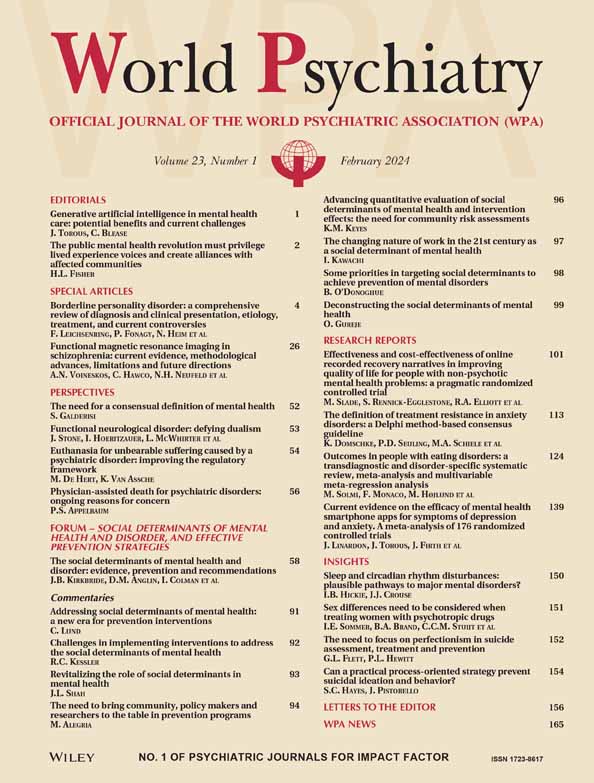WPA Working Group on Medical Students: current initiatives and future priorities
IF 65.8
1区 医学
Q1 PSYCHIATRY
引用次数: 6
Abstract
World Psychiatry 21:2 June 2022 WPA public health mission to emphasize the importance of risk factors and to adopt evidence-based preventive and rehabilitative interventions. The WPA Working Group on IDD has participated this year in the initiative called Rehabilitation 2030, sponsored by the WHO Department of Noncommunicable Diseases, Disability, Violence, and Injury Prevention, aiming to develop a package of rehabilitative interventions along with specified resource requirements for their delivery. The overarching goal is the improved care of persons with IDD across the lifespan, with a particular emphasis on LMICs. Following on these ground-breaking approaches in classification and evidencebased interventions, the Working Group is now promoting a second paradigm shift aiming to include training on IDD within mainstream psychiatry, once again with a particular emphasis on LMICs. Three important arguments justify this call. First, when polled about their knowledge on the impact of IDD, many trainees in psychiatry recognize the disproportionately high burden of co-occurring mental disorders in persons with IDD. Second, when offered opportunities to interact with persons with IDD during rotations, many trainees in psychiatry regard such experiences as highly formative and inspiring. Third, and most important, psychiatry as a profession has the potential to improve significantly the care for persons with IDD. Furthermore, the gap in mental health services for persons with IDD is too significant to be compensated by an ad hoc reliance on individual providers and families, and their resilience is not limitless. Moreover, within the context of the COVID-19 pandemic, persons with IDD are facing the utmost intensification of inequities in term of underlying medical liabilities, inability to socially distance, increased infection and mortality risks, challenges to participate in telehealth services, and ensuing social isolation and adverse mental health outcomes. The Working Group and the WPA leadership invite Member Societies to work collectively to enhance efforts for the development of inclusive training models in the mental care of persons with IDD. The Working Group is ready to provide awareness raising, training, and research collaboration to promote and disseminate effective services and thereby improve the lives and outcomes for persons with IDD. For this purpose, the Working Group is developing an open access handbook focusing on global aspects of the psychiatry of IDD, with authorship from both LMICs and high-income countries. In parallel, the Working Group is developing online educational materials summarizing the key aspects of psychiatric care in people with IDD. These resources will be accessible through the WPA educational portal in 2022. The WPA Working Group on IDD encourages systematic exposure to and experience in this area for all psychiatrists, so that they can adjust treatments for cooccurring mental disorders and avoid diagnostic overshadowing in which IDD may be wrongly considered the cause of all behavioural problems, and psychiatric, physical as well as environmental factors may be overlooked. Since relatives remain key partners as well as co-providers of services for people with IDD throughout their lives, the Working Group encourages provision of support to families by using local networks, with access to specialists for training and supervision as well as to more intensive forms of treatment for co-occurring problems (e.g., autism spectrum and seizure disorders). Third, the Working Group calls for the development of targeted mental health services including psychiatrists and allied professionals, who will need additional training to improve their diagnostic and therapeutic skills relevant to IDD. Finally, the Working Group emphasizes the need for person-centered care tailored on abilities and aspirations of affected persons, blending the social and medical models of development and disability within a human rights framework to improve access to health care, education and employment. These themes have been the subject of presentations in Presidential and State-ofthe-Art Symposia at the World Congress in Lisbon, and subsequently at the World Congresses in Bangkok, Thailand in March 2021, and Cartagena, Colombia in October 2021, and will continue to be addressed by the Working Group at forthcoming WPA congresses and conferences.WPA医学生工作组:当前举措和未来优先事项
世界精神病学协会公共卫生使命:强调危险因素的重要性,并采取循证预防和康复干预措施。世界卫生组织缺碘症工作组今年参加了由世卫组织非传染性疾病、残疾、暴力和伤害预防司发起的名为“2030年康复”的倡议,旨在制定一揽子康复干预措施及其实施所需的具体资源。总体目标是在整个生命周期中改善对缺碘症患者的护理,特别强调中低收入国家。在这些突破性的分类方法和循证干预措施之后,工作组目前正在推动第二次范式转变,旨在将缺碘症培训纳入主流精神病学,再次特别强调中低收入国家。有三个重要的理由支持这一呼吁。首先,当被问及他们对缺碘症影响的了解时,许多精神病学受训人员认识到缺碘症患者同时发生精神障碍的负担高得不成比例。第二,当在轮转期间有机会与缺碘症患者互动时,许多精神病学受训人员认为这种经历具有高度的成长性和启发性。第三,也是最重要的一点,精神病学作为一种职业具有显著改善对缺碘症患者护理的潜力。此外,缺碘症患者在心理健康服务方面的差距太大,无法通过临时依赖个别提供者和家庭来弥补,而且他们的复原力不是无限的。此外,在2019冠状病毒病大流行的背景下,IDD患者在以下方面面临着最严重的不公平现象:基本医疗责任、无法保持社交距离、感染和死亡风险增加、参与远程医疗服务面临挑战,以及随之而来的社会孤立和不良心理健康后果。工作组和世界残疾人协会领导层请会员协会共同努力,加强努力,为缺碘症患者的精神护理制定包容性培训模式。工作组准备提供提高认识、培训和研究合作,以促进和传播有效的服务,从而改善缺碘症患者的生活和结果。为此目的,工作组正在编写一本开放获取手册,侧重于缺碘症精神病学的全球方面,作者来自中低收入国家和高收入国家。与此同时,工作组正在开发在线教育材料,概述缺碘症患者精神病学护理的关键方面。这些资源将于2022年通过WPA教育门户网站提供。世界精神病学协会缺碘症工作组鼓励所有精神科医生系统地接触这一领域并积累这方面的经验,以便他们能够调整对同时发生的精神障碍的治疗方法,并避免诊断上的阴影,在这种情况下,缺碘症可能被错误地认为是所有行为问题的原因,精神、身体和环境因素可能被忽视。由于亲属仍然是缺碘症患者一生中重要的合作伙伴和服务的共同提供者,工作组鼓励通过利用当地网络向家庭提供支持,使其能够获得专家的培训和监督,并对同时发生的问题(如自闭症谱系和癫痫)获得更强化的治疗形式。第三,工作组呼吁发展有针对性的精神保健服务,包括精神科医生和相关专业人员,他们将需要额外培训,以提高与缺碘症有关的诊断和治疗技能。最后,工作组强调需要根据受影响者的能力和愿望提供以人为本的护理,在人权框架内将发展和残疾的社会和医疗模式结合起来,以改善获得保健、教育和就业的机会。这些主题已在里斯本举行的世界大会主席和最先进专题讨论会上作了介绍,随后在2021年3月在泰国曼谷和2021年10月在哥伦比亚卡塔赫纳举行的世界大会上作了介绍,并将在即将举行的世界环境协会大会和会议上继续由工作组讨论。
本文章由计算机程序翻译,如有差异,请以英文原文为准。
求助全文
约1分钟内获得全文
求助全文
来源期刊

World Psychiatry
医学-精神病学
自引率
7.40%
发文量
124
期刊介绍:
World Psychiatry is the official journal of the World Psychiatric Association. It is published in three issues per year.
The journal is sent free of charge to psychiatrists whose names and addresses are provided by WPA member societies and sections.
World Psychiatry is also freely accessible on Wiley Online Library and PubMed Central.
The main aim of World Psychiatry is to disseminate information on significant clinical, service, and research developments in the mental health field.
The journal aims to use a language that can be understood by the majority of mental health professionals worldwide.
 求助内容:
求助内容: 应助结果提醒方式:
应助结果提醒方式:


